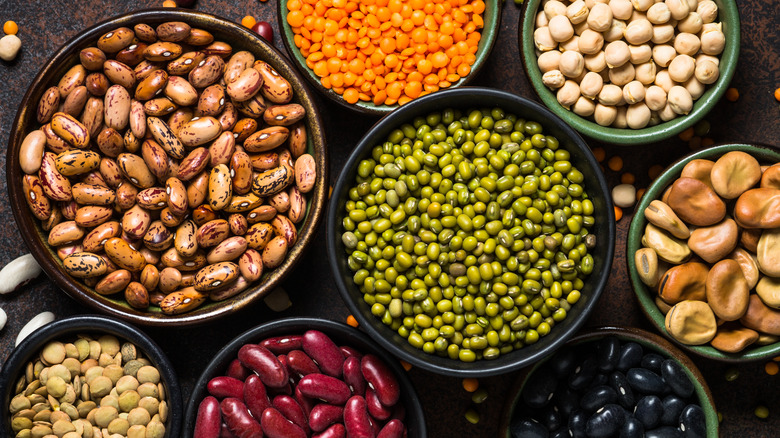Why You Should Never Add Salt Or Acidic Ingredients To Uncooked Beans
Canned beans offer convenience, but there's something to be said about cooking your own beans. When done correctly, flavors are amplified, and textures remain intact. Not to mention that since you're in charge of what goes into your legumes, sodium levels are lower and free of added preservatives. Although there are endless reasons why cooking your own beans reigns supreme, it's often easier said than done. This is why you should master a few rules of bean cookery, namely forgoing salt and acid.
It's true that no bean is like the other. With 15 categories of legumes and hundreds of cultivars (via Clean Green Simple), every bean has a unique flavor, texture, and use. However, one thing that they all have in common is their high fiber content and abundance of B vitamins states Healthline.
While cooking dried beans can be a healthy (and cost-effective) endeavor, it can also be overwhelming, especially if you're new to the process. There are several rules to abide by — like skipping acidic ingredients along with salt.
Salt and acid affect time and texture (sort of)
Beans beg for acidity in dishes, but according to Bon Appétit, ingredients like tomatoes, lemon, wine, or vinegar should be added when the beans are nearing the end of cooking, otherwise, they can make bean skins tough. This is because the acid prevents pectin in the beans' cell walls from dissolving, notes Salt Sear Savor.
As for salting, Fine Cooking explains that dried beans have a protective starchy layer that must be broken down by an enzyme called lipoxygenase as the beans cook. Salt, however, will reinforce cell walls and prevent beans from softening, which can slow down the cooking process — but only initially. Cooks Illustrated shares that as the beans cook, water eventually penetrates the skins, allowing the beans to cook faster, become softer, and maintain a concentrated flavor.
So what can you really blame tough beans on? The Spruce Eats reports that the fault is likely due to legumes that are past their prime or have been exposed to air. So, don't fear salt or acid. Just use good judgment when cooking your next batch of beans. All that's left to say is bean appétit!

